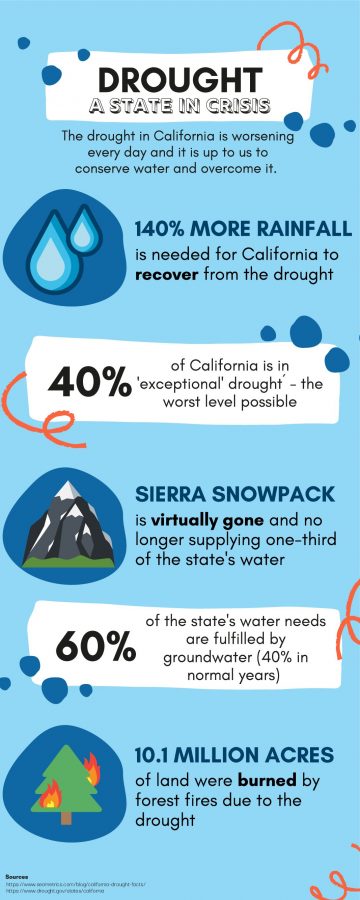What would it take to get out of the drought?
The drought in California is affecting our daily lives and the environment in which we live in a multitude of different ways.
November 15, 2021
As the drought in California persists, students have been thinking about whether or not Pleasanton will ever be able to overcome the water shortages that have affected our community. But, in light of the recent and forecasted rain, should the drought still be considered a worry and if so, what should be done in order to propel our community past it?
“I really do think that the rain that’s happened in the past few weeks has helped us a lot. Maybe, if we get more rain, we might be able to bring the drought under control,” said Nigel Purvis (‘24).
Causes of Drought
To put it simply, a drought is caused when there is a lack of moisture evident in the soil of a particular region. This lack of moisture is ultimately due to a dearth of rain and snow, or when a region experiences a drier and hotter period when compared to the ordinary climatic condition.
“Usually, we get a lot more rain than we’ve gotten this year and as we’ve gotten less rain and hotter days, the drought has been allowed to increase in how severe it is,” said Purvis.
When this pattern continues for extended periods of time, snowpack largely evaporates into the air or trickles into the ground instead of increasing the flow of streams and rivers. This way, the availability of water is greatly diminished, spurring a drought.
“Right now, the biggest cause of the drought is, of course, the change in our climate, which is affecting long-term weather patterns and then drought can also be exacerbated by our use of the resource, ” said AP Environmental Science teacher Robyn Fewster.
People play a big role in causing a drought as well. If we use too much water during times of normal rainfall, a scarcity of water may be apparent when hotter and drier weather conditions emerge. Some, however, do not realize just how much their actions can be pushing us deeper and deeper into the drought.
“It is the complete waste of water, like extra long showers, washing cars too often, and a general overuse of water that allows us to play a role in causing the drought,” said Purvis.
Effects of Drought
Due to a drought, soil starts to lack moisture and is bereft of the nutrients it needs to survive. As a result, varying species of plants start to dry out and die, ultimately allowing for a deficiency in biodiversity and a generally dry landscape.
“The effects of the drought impact our agricultural production. It affects our forests and the health of our ecosystem. It affects our fisheries and local businesses as well–and these are only the immediate effects,” said Fewster.
The drought also renders a substantial increase in wildfire risk. As plants die due to the lack of precipitation, there are an increased number of insect infestations and diseases, providing the fuel needed for wildfires to spread. Long periods of drought can therefore lead to more intense wildfires, which thereby affects our way of life.
“When I went to the Stanislaus River, that whole region and the forest were super dried up where there were patches of burnt forests, and it was just super sad to see,” said Evan Lucero (‘23).
Ways to Overcome Drought
In order to overcome the drought, steps need to be taken in order to conserve water. Some ways students can preserve water are by turning off the tap whilst brushing their teeth and washing their hands, taking a shower in five minutes, closing taps properly, and much more.
“We have sprinklers that are set on a timer and we also have an app that is based on the weather that will turn off and on the sprinklers when it is necessary. So if it’s already raining, it won’t turn on,” said Lucero.
Pleasanton, in an attempt to combat water shortages, has mandated 15% water reduction as the drought continues to worsen. Included in the mandate is a restriction placed on residents, limiting them to irrigating their yard solely once every week from the months of October to March.
“It is important to conserve water, because it is the most important natural resource we have. If you do not have access to clean, fresh water, you are dead within three days,” said Fewster.




